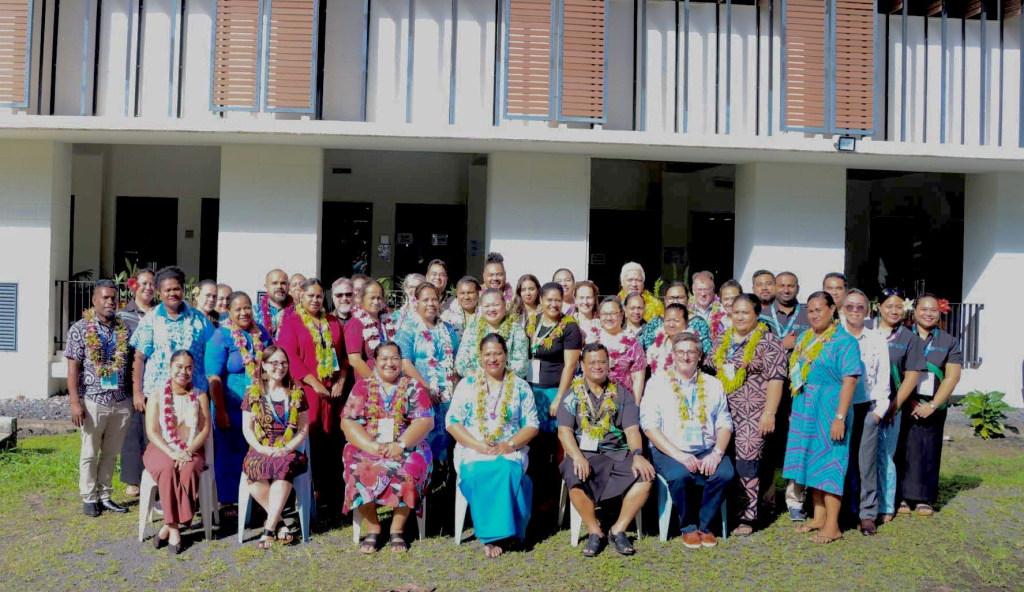
7 July 2025, Apia - Pacific countries manage over 10% of the world’s Ocean as Large Ocean States, and contribute less than 1.3% to global plastic pollution.
Despite this measly contribution to plastic pollution, Pacific communities remain on the forefront of impacts of the worsening plastic pollution crisis.
With 368 million metric tonnes of virgin plastics produced annually, projections have it that this number will double by 2040, with 90% of it ending up in the environment.
It is for this reason Pacific countries are deeply concerned about the “unchecked growth of plastic production and pollution.”
“We are facing a crisis that directly threatens our Ocean, our food systems, and our way of life,” said the Chief Executive Officer of Samoa’s Ministry of Natural Resources and Environment (MNRE), Ms Lealaisalanoa Frances Brown Reupena.
“That is why we are calling for bold global action: to reduce plastic production, eliminate toxic and unnecessary plastics, and ensure safer product design and labelling. These changes are non-negotiable, they are essential for protecting the health of our people, the resilience of our biodiversity, and the sustainable future of not just our island nations but the whole planet – our common home.”
Ms Reupena made the point when she opened the Pacific Small Island Developing States (PSIDS) preparatory meeting for the second part of the fifth session of the Intergovernmental Negotiating Committee to develop an international legally binding instrument on plastic pollution, including in the marine environment (INC-5.2), from 5 -14 August 2025 in Geneva, Switzerland.
This week from 7-9 July 2025 in Apia, Samoa, the PSIDS preparatory meeting facilitated by the Secretariat of the Pacific Regional Environment Programme (SPREP), and funded by the Government of Australia through the Pacific Ocean Litter Project (POLP), has brought to Samoa participants from Australia, Cook Islands, Federated States of Micronesia, Fiji, Kiribati, Nauru, New Zealand, Niue, Palau, Papua New Guinea, Republic of the Marshall Islands, Samoa, Solomon Islands, Tonga, Tuvalu and Vanuatu.

The gathering in Apia is an opportunity for Pacific countries to discuss priority issues, refine negotiating strategies, and build consensus on key positions for the global plastics treaty negotiations.
SPREP’s Director of Waste Management and Pollution Control (WMPC), Mr Anthony Talouli, welcomed everyone to SPREP and spoke about the importance of the work they are here to do.
“This work matters for the survival of our Pacific communities who have been unfairly placed at the forefront of the impacts of a crisis they did not create,” said Mr Talouli.
“As we look to INC 5.2 in Geneva, we know what is coming, we know what the like-minded countries will do, we need to prepare for what is to come. This week, let us work on how to respond and be willing to respond. SPREP is pleased to be able to provide the support to enable this most important work to continue.”
The upcoming INC round in Geneva follows five earlier rounds of negotiations: INC-1 in Punta del Este in November 2022, INC-2 in Paris in June 2023, INC-3 in Nairobi in November 2023, INC-4 in Ottawa in April 2024 and INC-5 in Busan Korea, November 2024.
Pacific countries have actively participated in each of the rounds, calling consistently for a high-ambition treaty that addresses the full life cycle of plastic, from production to disposal.
The Busan negotiations established a strong foundation for an agreement. However, there were strong disagreements over regulating the production of plastic or plastic polymers, a key raw material sourced from fossil fuels, and funding for the execution of any final agreement.
Ahead of INC5.2, the Chair of the INC, Mr. Vayas Valdivieso, released a draft text for parties to review and prepare their positions on.
In addressing the PSIDS meeting on Monday, Mr. Valdivieso urged Pacific countries to continue to build bridges and engage in meaningful dialogue to reverse and remedy the severe effects of plastic pollution on ecosystems and human health.
The Chair’s text is a key part of the work in Samoa this week.
Australia’s Acting High Commissioner to Samoa, Ms. Claire McGeechan, highlighted the importance of the spirit of partnership needed to address the increasingly complex and wide-reaching challenges that plastic pollution poses now, and for generations to come.
“We have already seen its profound impact on our ecosystems, fisheries, coastal tourism, human health, and even shipping and trade. So, it is concerning to see projections for plastic production doubling within the next 20 years. As well as projections that see the tripling of plastic waste leaking into the Ocean by 2040,” she said.
“Australia is committed to negotiating an effective and practical, legally binding instrument to ending plastic pollution. We seek an instrument that addresses the full cycle of plastics and provides globally coordinated approaches to support our existing efforts at home.”
The Pacific Small Island Developing States (PSIDS) preparatory meeting for INC5.2 is chaired by Tuvalu. Ms Pepetua Latasi, Permanent Secretary, Ministry of Home Affairs, Climate Change and Environment for Tuvalu, acknowledged the hard work by all Pacific countries and encouraged open and frank discussions to allow Pacific delegations to amplify their voice and country priorities in Geneva.